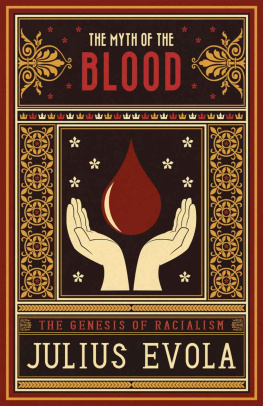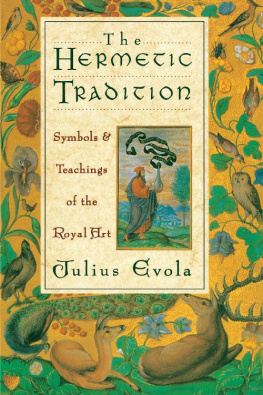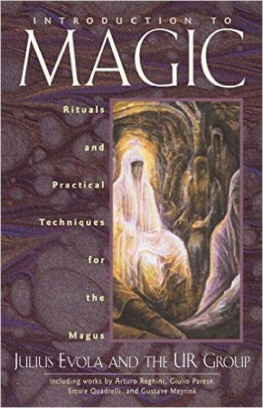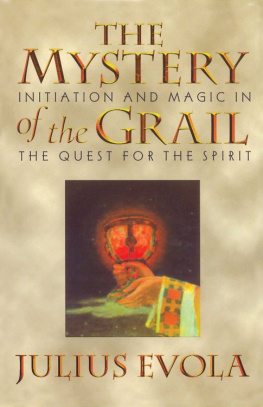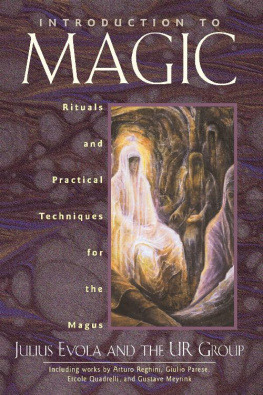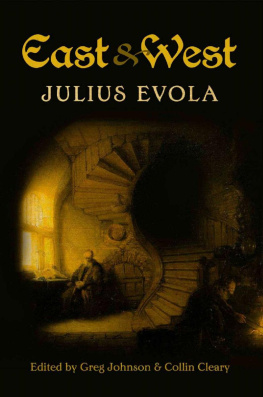Julius Evola
RECOGNITIONS
Studies on Men and Problems from the Perspective of the Right
Arktos
London 2018
Published in 2018 by Arktos Media Ltd.
All rights reserved. No part of this book may be reproduced or utilised in any form or by any means (whether electronic or mechanical), including photocopying, recording or by any information storage and retrieval system, without permission in writing from the publisher.
Originally published as Ricognizioni. Uomini e problemi. Italy, 1974.
Arktos.com | Facebook | Twitter | Instagram
Translation
John Bruce Leonard
Editor
Melissa Mszros
Cover
Tor Westman
Layout
Daniel Friberg
ISBN
978-1-912079-18-6 (Softcover)
978-1-912079-17-9 (Hardback)
978-1-912079-16-2 (Ebook)
Translators Forward
Recognitions is Evolas last book. That honor is usually, and in a way justly, accorded to Ride the Tiger , as this was the last book of unitary theme which Evola penned with the intention of publishing as a book. The present work rather has the character of a collection of various essays from Evolas last years. Nonetheless, it would be a mistake to consider this volume as being but a posthumous assemblage of the authors minor writings. Evola was alive when this book was published; it was indeed issued as the fifteenth number of a special series from the publishing house Edizioni Mediterranee called Orizzonti dello spirito , a series which Evola himself founded and personally directed almost until his death. The work in every way bears Evolas imprimatur, and it deserves to be regarded as his final opus not only for his personal oversight of its arrangement and publication, but also for its quality and its abiding pertinence.
Judging by its tone and its content, it is credible that Evola himself was aware that this should be his final literary effort, that he organized it as his final testament, his last word on the work of a lifetime. With the surety of a masters hand, he touches on most of the major themes that he made his own in the course of a rich, varied, and productive writing career. From esotericism to his exceptionally even-handed verdicts on modern and classic literary figures; from his investigations into the secret history of Antiquity to his relentlessly trenchant critiques of current events in politics and society; from his political Traditionalism to his metaphysical spiritualism, Recognitions is almost as wide-ranging as Evola himself. One emerges from this book as a diver who has delved, without the aid of any equipment, deep into the currents of some life-filled oceanamazed that he should have seen so much and been carried so profoundly in so brief a time, almost, as it were, in a single breath.
For this reason, Recognitions makes for an excellent introduction to Evolas thought. It can profitably be read from front to back as a survey of Evolas final judgements on any number of present or past philosophical, historical, and spiritual figures and currents; but it can also be browsed at pleasure and according to ones taste, beginning from those essays which treat of specific men and problems in which one is particularly interested. Each essay is naturally self-contained and can be read independently of its context; but at the same time, each essay is the product of Evolas remarkably integrated and organically interconnected ideas, so that the entire volume, though it be a compilation, nonetheless possesses a decided rhythmic and philosophical integrity. This makes for a certain richness which is unusual in compendia of this kind, and the diligent reader will certainly find that Recognitions bears reading and rereading.
I have referenced the pertinence of this book for our contemporary plight. Though the world has changed dramatically in the almost half-century since Evolas death, the problems that Evola most directly confronts are every bit as relevant today as they were in his time. The esoteric problems are, of course, perennial; so far as the political questions go, they have but extremified in the passage of the years. Nothing about our contemporary straits should have much surprised Evola. The organized chaos of the Fifth Estate whose advent he proclaims in Chapter 3 has done nothing but expand in influence. We have all of us danced, to some extent or other, the frenetic dance of the Tarantulas Bite of Chapter 8. The great forces which Western materialism has unleashed in the Orient, which Evola describes with such succinct skill in Chapter 11, perchance stand now upon the brink of flooding out upon the world. The question, considered in Chapter 23, of whether or not this West today has its idea, is more urgent than ever. And the culture of the Right, the historiography of the Right of the final chapters of this volume, are yet in need of the united work of our present generations. Indeed, looking at the world today, one is hard-pressed to find any contemporary current which Evola did not predict, and at least touch upon, precisely in the present essays.
The reader might of course propose certain issues of gravity which are not mentioned in the present volume. Yet this book precisely, as indeed all of Evolas work, can offer us something even more precious than the direct address of this or that specific problem; it can prepare us in spirit for all problems, for catastrophe itself; it can teach us the heights. Today, as much as the day it was first published, it is an inimitable resource for recognition of the times, and of ourselves within, and without, the times.
Note on the Title
Recognitions rings strangely in the English ear; but Ricognizioni is no less peculiar in the Italian. I have therefore not altered the title, as is sometimes done when foreign titles do not render well in secondary languages. I take it for granted that the name in all its peculiarity was selected quite deliberately.
Recognition means first and foremost to recognize the face of someonewhich means, by an older etymology, the persona , the personality , problem which occupies Evola deeply in the course of these essays, and particularly in those which are dedicated to the analysis of specific human beings or their work . Secondarily, recognition means to recognize merit or demerit, to rightly judge of the quality and the temperament of men and problems; thus we say, for instance, that such and such a man or action has been recognized with such and such an award. The title therefore indicates the importance of rank , of being able to perceive and adjudicate the quality of the characteristic figures of our time, and to locate them in an overall vision and hierarchy, according to the clear standards of the Right and the Tradition. Many of the essays herein are therefore naturally dedicated to correcting errors of recognitioncritiquing figures who are in urgent need of critique from the perspective of the Right, such as Giovanni Gentile, Giovanni Papini, and Pope Rancalli. Others are dedicated to recalling to our esteem congenial and important figures who are nigh-forgotten or underestimatedfigures certainly of the rank of Joseph de Maistre and Ren Gunon, but also lesser known names like Vilfredo Pareto and Werner Sombart, statesmen like Metternich, and names from a distant antiquity like Epicurus and Emperor Julian. Others yet are dedicated to sorting out problems upon which the Right has evidenced some degree of confusion or dithering, as the questions of work and of Masonry.
Finally, and most fundamentally, there is the innermost sense of recognition: not indeed the recognition of the ideas and rank of others, but the recognition of our own ideas, the rank of our own souls and spirits . Evolas investigations here serve principally to prepare the way for a new orientation, to use one of Evolas favorite words; they serve to direct us toward the heights, even as metal immediately feels the magnet, discovers the magnet and orients itself and moves irresistibly toward it (Chapter 6), and guide us to our proper place in a hierarchy dedicated to those heights. The contrary of a revolution which Evola hoped to prepare (and indeed, as multiple passages from this work attest, which he never ceased working toward and believing to be possible) can only begin within the men of the Right, in an internal revolution from the heights precisely contrary to that process of spiritual degeneration which he describes so hauntingly in his analysis of The Problem of Decadence.
Next page

